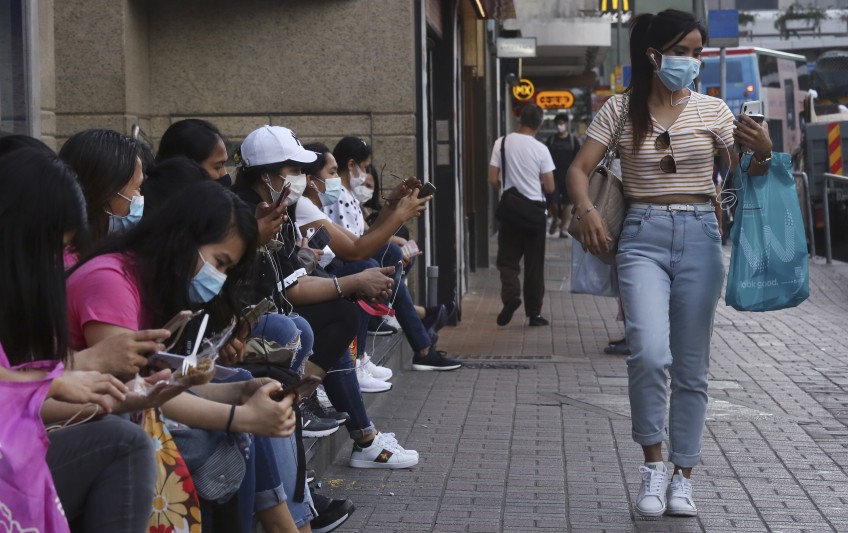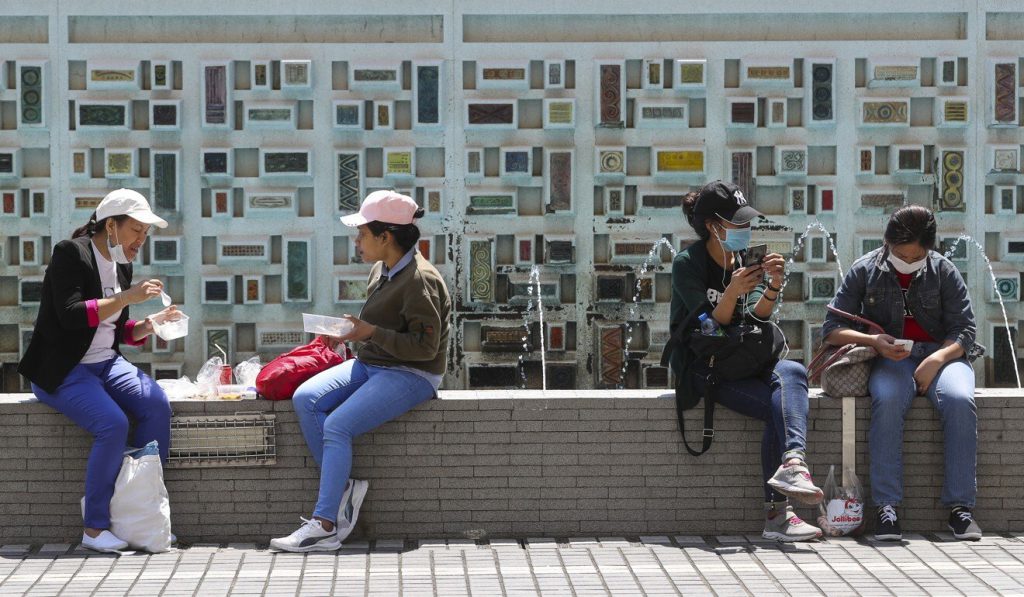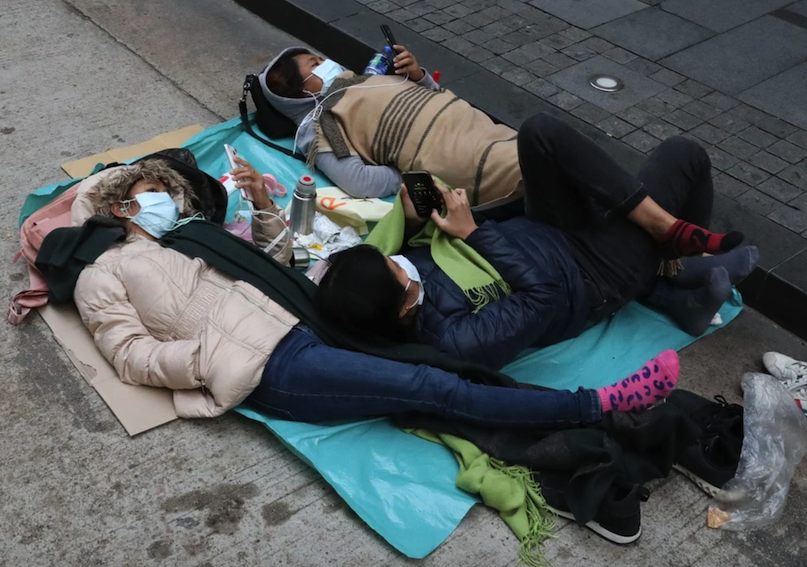‘Limited food, no wages’: Domestic workers struggle amid quarantine in Hong Kong

When Gloria – not her real name – returned to Hong Kong from the Philippines late last month, she had to do a mandatory quarantine imposed by the government to combat the coronavirus pandemic. While her employer put her in a hotel, those 14 days were all but easy.
“When my boss told me about doing the quarantine in a hotel, I asked her who would pay the expenses. She said she would. But then she told me to bring some biscuits and noodles,” says Gloria, who was under lockdown in the Philippines for about two months.
“Of course I could not bring enough food for 14 days. After a few days, she gave me one lunch and nothing else,” the domestic worker says.
Gloria has worked for the same employer for more than four years, but she ended up having to turn to a support group that provided her with meals. “Luckily, there are many people here who are willing to help,” she says.
Other than having limited access to food, Gloria, who is in her 30s, also did not receive her salary during those two weeks. Yet, she decided not to complain to the consulate or the Labour Department out of fear of getting fired.
“I have three children and my husband doesn’t have a job now because of the coronavirus [crisis], so my salary is very important,” Gloria says.
She is among dozens of domestic workers who have recently returned from their home countries – mostly the Philippines and Indonesia – to Hong Kong as travel restrictions are slowly being lifted.
Domestic workers are being placed in a vulnerable situation … Many don’t want to complain because they don’t want to be terminated and some are not aware of their rights – Indonesian Migrant Workers Union
With thousands of other migrants expected to land in the city in the coming months, rights groups are urging the government to make sure domestic workers are given proper accommodation and food during quarantine, while instructions upon arrival should be provided in multiple languages. They also call on authorities to set up a special complaints mechanism that deals only with queries related to Covid-19.
Sringatin, chairwoman of Indonesian Migrant Workers Union, says that at least 10 Indonesian workers have complained about poor conditions during quarantine, but total numbers are yet to be compiled.

The union leader says she is aware of cases of domestic workers who were fired after they experienced some symptoms similar to those of Covid-19, although they have not tested positive. She has also come across workers whose salaries were not paid during the quarantine.
“Domestic workers are being placed in a vulnerable situation – put under quarantine and not paid. Many don’t want to complain because they don’t want to be terminated and some are not aware of their rights,” Sringatin says.
Others have to deal with technological and language barriers that prevent them from understanding the instructions given by authorities.
Food that does not meet their religion requirements has also been an issue, she says.
“We know of this domestic worker who was sent to a government quarantine centre, where she was not given suitable food. She is Muslim, so she can’t eat pork,” the migrant activist says.
Sringatin says she is particularly worried about the newcomers who are unfamiliar with the city. Thousands are expected to arrive in the coming months.
“The government needs to provide clear information and instructions in multiple languages on how they can ensure their rights,” the union leader says.
Sringatin says the Labour Department should introduce a complaints system to deal with coronavirus-related queries, instead of having the workers using the general support line.
The union leader also calls for a subsidy to help employers with the costs of the mandatory quarantine. “We know that employers are also facing some financial difficulties. So if workers don’t go to quarantine centres that meet the standards, the government could help employers to cover the cost of a hotel where workers can do the quarantine,” she says.
In Hong Kong, those who hire domestic workers are required to provide suitable accommodation in their homes as well as food or an allowance.
Last weekend, a group of employment agencies called for newly hired domestic workers to be quarantined in government centres on their arrival in Hong Kong, as most local families did not want to house them over the quarantine period and take health risks.
Dr Leung Yiu-hong, chief port health officer of the Centre for Health Protection, said at a Legislative Council committee meeting on Monday that the government was in talks with the hospitality industry on finding cheap hotels where the workers could spend the compulsory 14 days of isolation.
Cynthia Abdon-Tellez, head of the Mission for Migrant Workers, says her group has received multiple quarantine-related queries, mostly from Filipino domestic workers.
“Food has been a major issue. We encountered one case where she was made to eat only noodles for several days,” she says.
Abdon-Tellez says that from March to May, her group received 135 queries from domestic workers who have raised mostly coronavirus-related issues. The lack of a day off has remained a problem since the beginning of the pandemic, with some workers being prevented from leaving the house of their employers for several months now.
“We talked to this worker who told us that she hasn’t had a day off since January. She is not allowed to go out, although the members of the family go in and out of the house. She is under a lot of stress, but she does not want to be fired,” the activist says.

Filipino consul general Raly Tejada says his office has received some complaints, such as “workers not getting enough food or crowding in facilities used as quarantine centres”.
Tejada estimates that about 12,000 Filipino workers are expected to arrive to Hong Kong in the next few months, including about 7,000 newly hired workers and another 4,700 who had been previously fired and had found new employers.
“We are working with the Hong Kong government to ensure that agencies and their employers comply with their obligations pertaining to the two-week quarantine rule for arriving workers in Hong Kong,” he says.
The Indonesian consulate did not respond to queries sent by This Week in Asia.
A spokesman for the Labour Department says that unless domestic workers come from countries or places where after risk assessment returnees are required to stay at quarantine centres, their employers should make “prior arrangements” so the workers can do the compulsory quarantine.
“Employers are also reminded to comply with their obligations under the standard employment contract, including bearing the accommodation expenses, providing food allowance … and not to compel their foreign domestic helpers to work outside of their residence,” the spokesman says.












Leave a Reply